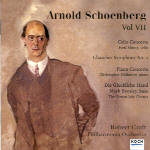Volume 7 of Robert Craft’s ongoing Schoenberg cycle makes an excellent introduction to the composer’s almost schizophrenically wide-ranging body of work. For example, there’s his very zany transcription for cello and orchestra of a concerto by Baroque composer G. M. Monn, superbly played by Fred Sherry (though Craft’s attack on the Ma/Ozawa recording in his notes is unnecessary even if musically correct, and he’s wrong in claiming that his is the first recording to accurately reflect the composer’s wishes: Schiff/Gielen on Wergo is no slouch in that department).
As with Craft’s lively recording of the first chamber symphony, this one of the comparatively neglected No. 2 has energy and color in abundance, with a particularly well-shaped second movement. In the lovely Piano Concerto, Christopher Oldfather reveals less pianistic personality than, say, Mitsuko Uchida or Alfred Brendel, but Craft’s swiftly flowing reading binds the work together with an impressive sense of purpose, and the soloist’s willingness to retire discretely permits the recording to capture a wealth of attractive detail. It’s a performance that really cheats the clock.
Finally, there’s Die Glückliche Hand, a 20-minute-long nutcase of an opera with a single solo singing role (there’s also a chorus) that portrays the age-old battle between the sexes as only a Viennese expressionist can. Mark Beesley sings his few lines as well as anyone needs to, and the music, hugely overwritten and hyper-detailed beyond the ability of any performance to realize all of the composer’s intentions, erupts from the speakers in this vivid rendition like some bad dream. Which is, of course, exactly the point. Good, clear sonics make this disc a winner all around.
































